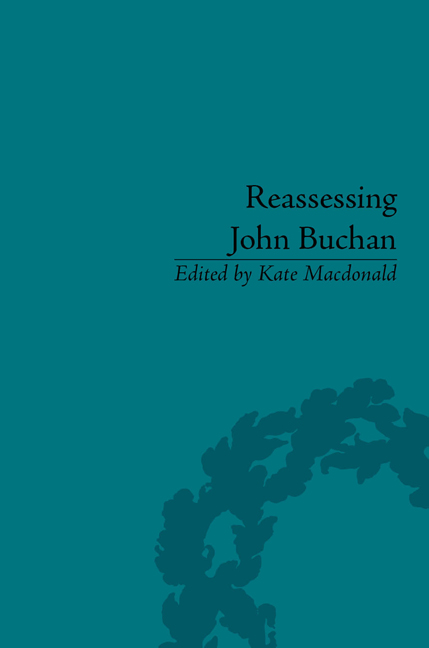Book contents
- Frontmatter
- CONTENTS
- List of contributors
- Introduction
- I Cultural Roots
- 1 John Buchan and Calvinism
- 2 Buchan and the Classics
- 3 ‘Twin Loyalties’: John Buchan's England
- 4 Buchan, Sport and Masculinity
- 5 John Buchan and the Creation of the Springbok Warrior
- II Divided Loyalties
- III Literary Art
- Notes
- Works Cited
- Index
1 - John Buchan and Calvinism
from I - Cultural Roots
- Frontmatter
- CONTENTS
- List of contributors
- Introduction
- I Cultural Roots
- 1 John Buchan and Calvinism
- 2 Buchan and the Classics
- 3 ‘Twin Loyalties’: John Buchan's England
- 4 Buchan, Sport and Masculinity
- 5 John Buchan and the Creation of the Springbok Warrior
- II Divided Loyalties
- III Literary Art
- Notes
- Works Cited
- Index
Summary
Home environment contributes to the making of a mindset. A Presbyterian and ostensibly Calvinist Scot, born in Perth, on the east coast of Scotland, but brought up in Presbyterian manses, first in Pathhead (Fife), and then to the west of Scotland in Glasgow, could hardly escape being aware that Calvinism could be doctrinaire and legalistic. John Buchan's thoughts about his parents and other Calvinists he encountered in his early life will be discussed below. As a boy, he intuitively sought to develop a natural literary flair for his imaginative and critical pursuits. Calvinism was an important part of his life. Throughout his life he remained a Presbyterian, but as a liberal Calvinist with distinctly ecumenical leanings.
Most who have heard of Buchan plump for The Thirty-Nine Steps (1915), one of his First World War espionage ‘shockers’. These and his later novels exemplify his imaginative range, as do his contributions to the short story genre, more than one political symposium and his biographies. His posthumous autobiography Memory Hold-the-Door (1940), as his preface indicates, is like a prolegomenon for work on religion and philosophy that he did not live to complete. In this memoir he demonstrates how his formal education as a classicist ‘mellowed’ his avowed initial ‘Calvinism’. This chapter makes an attempt to discern what this change meant in Buchan's life, and when it began.
John Calvin (1509–64) was a classically trained lawyer, intended initially for the Roman Catholic priesthood, but came to accept and develop Luther's Protestant Reformation. Besides writing many commentaries on Scripture his chief work was the Institutes of the Christian Religion (1536–59), which fathered a ‘presbyterian’ form of church order, still the norm in the Church of Scotland and its offshoots. The World Alliance of Reformed Churches embraces similar churches globally.
Along with Calvin's focus on Scripture and the Early Fathers we might note his doctrine of ‘double predestination’, that is, that some would be damned and some would be saved. This evoked controversy within Calvinist circles.
- Type
- Chapter
- Information
- Reassessing John BuchanBeyond the Thirty Nine Steps, pp. 7 - 16Publisher: Pickering & ChattoFirst published in: 2014

